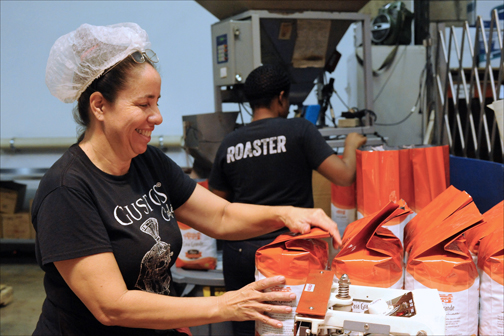Gustos Coffee: Focus on local market first, export later


Maybelline Fermaint-Torres packages Casa Grande coffee at the Gustos Coffee Co. production facility in Guaynabo. (Credit: Larry Luxner)
Hidden in a Guaynabo industrial park — and wedged among a department store, an air-conditioning distributor and a manufacturer of industrial equipment — Gustos Coffee Co. runs one of San Juan’s most eclectic coffee shops as well as a roasting plant aimed at satisfying the indulgences of demanding local coffee drinkers
Omar Torres, president of Gustos, says he’s been in business since 1999 and now focuses on specialty coffee, even though the industry itself is going through hard times.
“Coffee has been in decline here for the past eight years, and the last five years have been even more dramatic,” he said.
“The biggest problem in the last decade is the world economy and oil prices, which have raised the cost of growing coffee on the island. Oil prices have come down now, but over the last 10 years when they were going up, it affected the cost of fertilizer and insecticides. Farmers were losing money but the government didn’t raise coffee prices to keep up. Even so, our company has been growing every year no matter what,” said Torres, though he declined to discuss revenues.
Gustos has 75 employees and two 12,000-square-foot warehouses, one here and one in Ponce, making it a rising star in the Puerto Rican coffee industry.
“We now focus on specialty coffee and are involved in every aspect of the business, from office coffee service to cafeterias, bakeries and restaurants,” he said. In fact, 95 percent of Gustos Coffee’s business is food service, said Torres, 51, whose family has owned restaurants in both Puerto Rico and the U.S. Virgin Islands.
“From the day we started, our focus has been on having the best coffee possible. Because of that, in the beginning we didn’t roast coffee. But I realized that I was not able to get the coffee I wanted on a consistent basis,” said Torres. The company soon began growing its own coffee in Yauco, and now packages coffee under the Casa Grande label.
Just over three years ago, Torres — who studied hotel and restaurant management at Michigan State University — opened his Gustos Café boutique coffee shop.
Nobody would mistake this place for a Starbucks. For one thing, its décor is rather unusual, ranging from the bright orange portafilter door handles at the entrance to its rustic atmosphere, complete with antiques such as a 1970 Vespa motorcycle hanging from the ceiling, a huge industrial coffee grinder from the early 1950s and a small portable Remington typewriter dating from before World War II.

Professional barista Viviana Cruz prepares an espresso at Gustos Café in Guaynabo. (Credit: Larry Luxner)
Behind the counter, skilled baristas such as Viviana Cruz and Gioella Malatrasi make espressos and pour-overs as they happily chat with customers, many of whom work at Claro, Triple-S and other nearby businesses off F.D. Roosevelt Ave.
There’s also a cupping room with a rotating table, and a special room where barista classes are offered. The café also features breakfast fare such as oatmeal, fresh fruit and egg dishes, and for lunch, mostly wraps.
“The front of the house is a showpiece,” Torres said as he walked through his enormous warehouse full of espresso machines and coffee equipment awaiting delivery to clients or undergoing repairs.
Torres is not shy when it comes to offering opinions on why the island’s coffee industry is in decline.
“For Puerto Rico’s coffee industry to be successful, we need to find a way to consistently export,” he told this media outlet. “But for now we’re focusing on the local market. It makes no sense to export today and not be able to export tomorrow.”
A big part of the problem, he said, is protectionism, which has prevented Puerto Rico from developing exports in the way Costa Rica, Hawaii and Jamaica have done so.
“Puerto Rico has suffered because of excessive government controls over the years. Puerto Rican and Hawaiian coffee are very similar in quality and taste, yet Hawaii did not have the protections Puerto Rico had. Therefore, it used market strategies to promote Hawaiian coffee worldwide over the last 50 years. They found a way to survive,” Torres complained.
“The fact is that for coffee farmers to survive, we need the export business. Yet we’ve allowed 50 years to go by without marketing our coffee, and now farmers have no need for great coffee to export because they can sell it locally,” he said.
In contrast, Hawaii sells its beans for $10 a pound, and Jamaica for $40 a pound.
Puerto Rico, on the other hand, can’t even produce enough coffee to satisfy local consumption, so the government is forced to import about 25 million pounds a year from Mexico. Because of price controls, imported coffee is now cheaper here than local coffee.
In the long term, a bigger problem is the island’s perennial labor shortage when it comes to coffee, since the industry is prohibited from importing low-cost workers from the Dominican Republic or other countries.
“Nobody wants to pick coffee beans. They’d rather just be on welfare,” he said, adding, “the best pickers are more than 60 years old. They’re the type of people willing to wake up at 5 a.m. and work until noon, or until they make $25 and they’re happy. Today’s youth don’t have that mentality, so we worry what’s going to happen in the future.”











